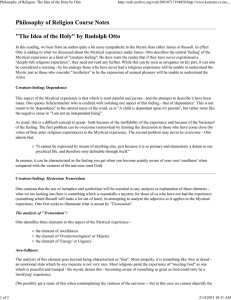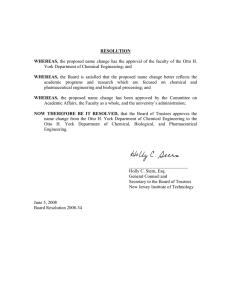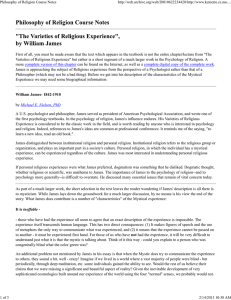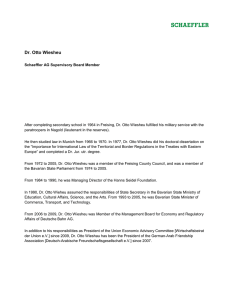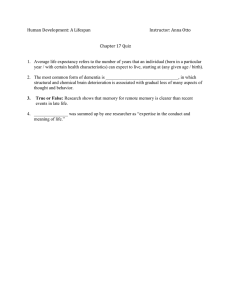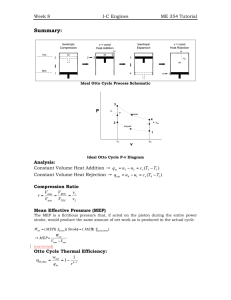Otto's Idea of the Holy: Mysticism & Religious Experience
advertisement
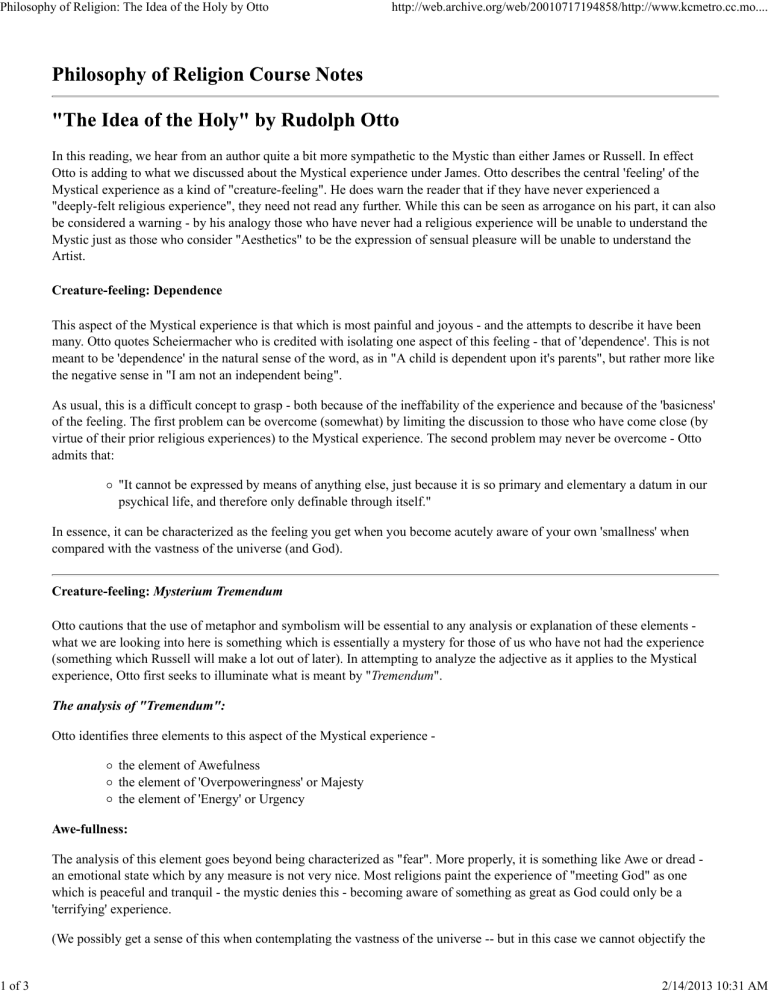
Philosophy of Religion: The Idea of the Holy by Otto 1 of 3 http://web.archive.org/web/20010717194858/http://www.kcmetro.cc.mo.... In this reading, we hear from an author quite a bit more sympathetic to the Mystic than either James or Russell. In effect Otto is adding to what we discussed about the Mystical experience under James. Otto describes the central 'feeling' of the Mystical experience as a kind of "creature-feeling". He does warn the reader that if they have never experienced a "deeply-felt religious experience", they need not read any further. While this can be seen as arrogance on his part, it can also be considered a warning - by his analogy those who have never had a religious experience will be unable to understand the Mystic just as those who consider "Aesthetics" to be the expression of sensual pleasure will be unable to understand the Artist. Creature-feeling: Dependence This aspect of the Mystical experience is that which is most painful and joyous - and the attempts to describe it have been many. Otto quotes Scheiermacher who is credited with isolating one aspect of this feeling - that of 'dependence'. This is not meant to be 'dependence' in the natural sense of the word, as in "A child is dependent upon it's parents", but rather more like the negative sense in "I am not an independent being". As usual, this is a difficult concept to grasp - both because of the ineffability of the experience and because of the 'basicness' of the feeling. The first problem can be overcome (somewhat) by limiting the discussion to those who have come close (by virtue of their prior religious experiences) to the Mystical experience. The second problem may never be overcome - Otto admits that: "It cannot be expressed by means of anything else, just because it is so primary and elementary a datum in our psychical life, and therefore only definable through itself." In essence, it can be characterized as the feeling you get when you become acutely aware of your own 'smallness' when compared with the vastness of the universe (and God). Creature-feeling: Mysterium Tremendum Otto cautions that the use of metaphor and symbolism will be essential to any analysis or explanation of these elements what we are looking into here is something which is essentially a mystery for those of us who have not had the experience (something which Russell will make a lot out of later). In attempting to analyze the adjective as it applies to the Mystical experience, Otto first seeks to illuminate what is meant by "Tremendum". The analysis of "Tremendum": Otto identifies three elements to this aspect of the Mystical experience the element of Awefulness the element of 'Overpoweringness' or Majesty the element of 'Energy' or Urgency Awe-fullness: The analysis of this element goes beyond being characterized as "fear". More properly, it is something like Awe or dread an emotional state which by any measure is not very nice. Most religions paint the experience of "meeting God" as one which is peaceful and tranquil - the mystic denies this - becoming aware of something as great as God could only be a 'terrifying' experience. (We possibly get a sense of this when contemplating the vastness of the universe -- but in this case we cannot objectify the 2/14/2013 10:31 AM Philosophy of Religion: The Idea of the Holy by Otto 2 of 3 http://web.archive.org/web/20010717194858/http://www.kcmetro.cc.mo.... experience using our methods of scientific inquiry or dispassion. In essence we are 'sucked into' the Divine and cannot stop it - it simply overwhelms us. Smith alludes to this in the following passage as the feeling of being utterly out of control of the experience: "Mysticism breaks through the boundaries that protect the faith of the typical believer. In doing so it moves into an unconfined region that, fulfilling though it is for some, carries dangers for those who are unqualified for its teachings. Without there literal meaning being denied, dogmas and prescriptions that the ordinary believer sees as absolute are interpreted allegorically, or used as points of reference (by the mystic) that may eventually be transcended. Particularly shocking to some is the fact that the mystic often claims, if only by implication, an authority derived directly from God and a knowledge given from above rather than learned in the schools." (Houston Smith, "The World's Religions") Majesty: In addition to the feeling that the Divine is unapproachable, Otto identifies the second element of the Mystical experience as a feeling of Absolute Majesty or Overpoweringness. This is the element which gives rise most especially to the attitude of religious humility. This humility is most evident in the attitude of self-depreciation on the part of the Mystic. The Mystic will not want others to see them as "blessed" or "special", indeed they are most acutely aware of the fact that of all the beings in the universe, they are the most un-worthy to experience God. Part of this humility stems from the awareness on the part of the Mystic that they are fairly insignificant in relation to the universe, and in part from the "Majesty" of the Divine reality - they are so focused on God that they literally 'lose their selves' during the experience. Essential to this experience is also the awareness that the Mystic is only a small part of a much greater whole. Energy: The third element of the Mystical experience expressed by the adjective "Tremendum" is that of the sense of an incredible 'energy' or 'urgency' to the Divine reality. Above all the experience of the Mystic is of a vibrant, living, active reality. This aspect, of course, is taken like the rest to the utmost reaches of our consciousness - beyond the ability of language to express it's nature. It is no wonder that Mystics have often used the language of love to express this element - we all have a sense of what it is to feel the power of love, but often cannot find the words to express it (hence all the songs on the radio!) The analysis of "Mysterium": Otto stresses two aspects of this element: That the experience of the Mystic is of something "wholly other" than anything else, and that it should not be separated from the elements of the "Tremendum". 'Mystery' without the elements of 'Majesty' is possible, but not likely. Even the mention of a thing as mysterious naturally connects it with the unknown - which we are afraid of. An awareness of God limited to the mysteriousness of God will be like water outside of a pot - largely useless, unenlightening and in the end, confusing. Likewise, 'Majesty' without the 'Mystery' will also fall short of the experience of the Divine. If we limit our awareness of God to the 'Majesty', we will get a picture of God which is arbitrarily shaped into a form - which in the end becomes like an empty vessel. What the Mystic tries to communicate to us is the complete "otherness" of the Divine - while this may be done via metaphor or symbolism, these forms are meant to be subordinate to the experience - just because we seem to understand the metaphor, does not mean we truly understand the Divine nature that it seeks to explain. Discussion Questions: There will be a slightly different format to the questions this time around. Consider the following quotes from those individuals identified as Mystics and see if you can identify the elements of the "Mysterium Tremendum" in each. 2/14/2013 10:31 AM Philosophy of Religion: The Idea of the Holy by Otto 3 of 3 http://web.archive.org/web/20010717194858/http://www.kcmetro.cc.mo.... God is a circle whose center is everywhere, and its circumference nowhere. (Empedocles, B.C. 495-435) All are but parts of one stupendous whole, whose body Nature is, and God the soul. (Pope, 1688-1744) The more God is in all things, the more He is outside them. The more He is within, the more without. (Meister Eckhardt, 1260-1327) God, whose boundless love and joy Are present everywhere; He cannot come to visit you Unless you are not there. (Angelus Silesius) "I saw my Lord with the eye of the Heart. I said: `Who are you?' He answered: `You.'" (Al-Hallaj) It is easy to understand God as long as you don't try to explain him. (Joubert, 1754-1824) God is a reality of the spirit...He cannot....be conceived as an object, not even as the highest object. God is not to be found in the world of objects. (Nicholas Berdyaav, 1874-1948) End of notes on "The Idea of the Holy" by Rudolph Otto copyright 1997©Michael J. Connelly, Longview Community College One of the Metropolitan Community Colleges "Where a Smart Future Begins" An Equal Opportunity/Affirmative Action Employer Inquiries to:connelly@longview.cc.mo.us last update: 4/21/1997 (file address: www.kcmetro.cc.mo.us/longview/socsci/philosophy/religion/otto.htm) 2/14/2013 10:31 AM
